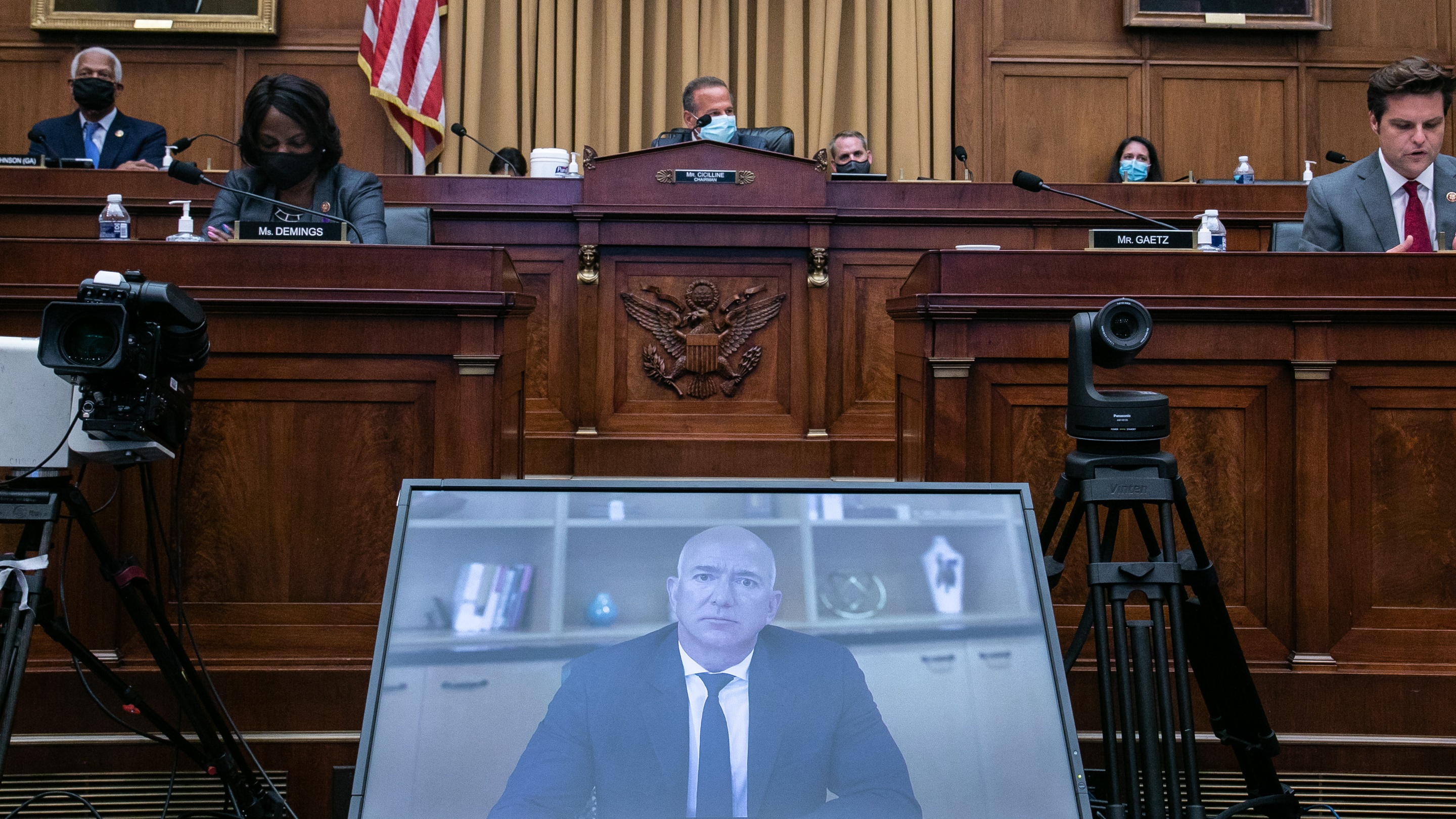Four things we learned from US Congress grilling of the Silicon Valley tech titans
Previously unseen internal documents and emails granted Congress new licence to probe

A free daily email with the biggest news stories of the day – and the best features from TheWeek.com
You are now subscribed
Your newsletter sign-up was successful
The chiefs of the world’s biggest tech companies have faced a grilling about their business practises, during a video-conference hearing with the US Congress today.
Facebook’s Mark Zuckerberg, Google’s Sundar Pichai, Apple’s Tim Cook and Amazon’s Jeff Bezos were questioned by both Democrat and Republican lawmakers, though the proceedings were hit by a series of technical glitches, The Washington Post reports.
At one point, a committee member was forced to inform the Amazon CEO and world’s richest man: “Mr Bezos, I believe you’re on mute.”
The Week
Escape your echo chamber. Get the facts behind the news, plus analysis from multiple perspectives.

Sign up for The Week's Free Newsletters
From our morning news briefing to a weekly Good News Newsletter, get the best of The Week delivered directly to your inbox.
From our morning news briefing to a weekly Good News Newsletter, get the best of The Week delivered directly to your inbox.
Many of the questions posed by the House Judiciary Committee related to previously unseen internal documents and emails that appear to illuminate underhand tactics to extinguish competition and enhance the tech giants’ power. Here are four things we learned from the six-hour grilling:
Tech Bosses aggressively pursued market dominance
The Financial Times reports that the committee was keen to take Zuckerberg to task for comments he made in a 2012 email in which he acknowledged that his decision to acquire photo-sharing app Instagram was motivated by a desire to “neutralise” the social media rival.
Other records showed that Instagram’s founder was worried that Zuckerberg would go into “destroy mode” if he declined his offer to buy his company.
A free daily email with the biggest news stories of the day – and the best features from TheWeek.com
Pichai faced similar allegations, with the committee pointing to documents that show Google’s executives warned that other search engines were getting “too much traffic” - a problem they attempted to rectify by turning it into “walled garden that keeps users on Google sites, even if Google doesn’t have the most relevant information”, said the antitrust panel’s chair, Democratic representative David Cicilline.
Bezos faced a line of questioning relating to how Amazon uses data from its platform’s two million third-party sellers in order to develop its own products and how successful third-party sellers are alleged to have been treated poorly.
Apple’s Cook, who was asked the least questions across the hearing, was forced to deflect claims that Apple store data was being used to unfairly favour certain apps.
Big Tech aren't big fans of ‘cancel culture’
Republican lawmakers were keen to assail the tech chiefs for what they see as increased censorship of conservative voice online.
The Telegraph reports that when Ohio congressman Jim Jordan asked Cook about the topic, the Apple boss replied: “If you are talking about where somebody with a different point of view talks and they are cancelled, I do not think that is good.”
Zuckerberg also took the opportunity to voice his concerns, stating that he “very worried about some of the forces of illiberalism I see in this country that are pushing against freedom of expression”. Bezos, in the same vein, labelled social media a “nuance destroying machine”.
Democrats and Republicans have very different priorities
One defining feature of the hearing was the stark contrast in the subject priorities of the Democrat and Republican questioners.
Republicans took up most of their time with the topic of censorship, The Washington Post says, whereas Democrats sought to hone in on Zuckerberg and co.’s past email exchanges to tease out anti-competitive sentiment.
It was at times “like watching two parallel hearings happening at the same time”,The Telegraph says of the hearing, which at one point saw Democrats accuse their Republican colleagues of harboring a “persecution complex”.
“The Democratic and Republican sides of the aisle operate in entirely different universes, with priorities and demands that often pull directly against each other” the paper adds.
Politicians are worried that the pandemic has extended Big Tech’s power
Panel chair Cicilline used his opening marks to describe in-depth the dominance of each company in their respective market sub-sectors.
“As American families shift more of their work, shopping, and communication online, these giants stand to profit,” the Rhode Island congressman said. “Locally owned businesses, meanwhile - Mom and Pop stores on Main Street - face an economic crisis unlike any in recent history.”
NPR reports that Cicilline was keen to draw comparisons with America’s other business monopolies: railroads and oil were mentioned, as was the telecommunications sector.
As a second surge of coronavirus casees threatens to sweep across America, putting thousands of vulnerable businesses at risk, making sure the biggest winners of the crisis step into line could be vital, the lawmakers warned.
-
 Bad Bunny’s Super Bowl: A win for unity
Bad Bunny’s Super Bowl: A win for unityFeature The global superstar's halftime show was a celebration for everyone to enjoy
-
 Book reviews: ‘Bonfire of the Murdochs’ and ‘The Typewriter and the Guillotine’
Book reviews: ‘Bonfire of the Murdochs’ and ‘The Typewriter and the Guillotine’Feature New insights into the Murdoch family’s turmoil and a renowned journalist’s time in pre-World War II Paris
-
 Witkoff and Kushner tackle Ukraine, Iran in Geneva
Witkoff and Kushner tackle Ukraine, Iran in GenevaSpeed Read Steve Witkoff and Jared Kushner held negotiations aimed at securing a nuclear deal with Iran and an end to Russia’s war in Ukraine
-
 How corrupt is the UK?
How corrupt is the UK?The Explainer Decline in standards ‘risks becoming a defining feature of our political culture’ as Britain falls to lowest ever score on global index
-
 Grand jury rejects charging 6 Democrats for ‘orders’ video
Grand jury rejects charging 6 Democrats for ‘orders’ videoSpeed Read The jury refused to indict Democratic lawmakers for a video in which they urged military members to resist illegal orders
-
 Democrats push for ICE accountability
Democrats push for ICE accountabilityFeature U.S. citizens shot and violently detained by immigration agents testify at Capitol Hill hearing
-
 Big-time money squabbles: the conflict over California’s proposed billionaire tax
Big-time money squabbles: the conflict over California’s proposed billionaire taxTalking Points Californians worth more than $1.1 billion would pay a one-time 5% tax
-
 ‘The censorious effect is the same, even if deployed covertly’
‘The censorious effect is the same, even if deployed covertly’Instant Opinion Opinion, comment and editorials of the day
-
 Will Peter Mandelson and Andrew testify to US Congress?
Will Peter Mandelson and Andrew testify to US Congress?Today's Big Question Could political pressure overcome legal obstacles and force either man to give evidence over their relationship with Jeffrey Epstein?
-
 Rep. Ilhan Omar attacked with unknown liquid
Rep. Ilhan Omar attacked with unknown liquidSpeed Read This ‘small agitator isn’t going to intimidate me from doing my work’
-
 ‘Dark woke’: what it means and how it might help Democrats
‘Dark woke’: what it means and how it might help DemocratsThe Explainer Some Democrats are embracing crasser rhetoric, respectability be damned